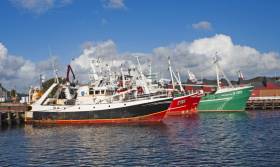Displaying items by tag: Work Permits
Renewed Calls for Changes to Fishing Crew Work Permits
RTÉ News reports on fresh calls to update work permits for non-European workers in the Irish fishing industry.
According to the International Transport Workers’ Federation (ITF), moving migrant fishers from the Atypical Work Permit Scheme to the Critical Skills Permit Scheme would allow them to challenge dangerous working conditions, such as excessive hours, and also change employers.
A recent report from Maynooth University funded by the ITF accused employers of using the current regime to exploit migrant workers — findings that have been rejected by the industry.
RTÉ News has more on the story HERE.
Low Numbers Apply For Migrant Fishing Crew Permits
#Fishing - The Migrant Rights Centre Ireland (MRCI) has called on the deadline for applications for migrant fishing work permits to be extended as it has emerged that only 60 applications have been received.
Last November, then Marine Minister Simon Coveney announced that renewable work permits for non-EEC nationals in the Irish fishing industry would be limited to 500.
The move came in the wake of damning claims of widespread exploitation of migrant labour in the fishing fleet around Ireland, allegations that were later criticised by many in the industry.
But as The Irish Times reports, the new scheme to protect migrant workers from low pay and long hours has attracted only 60 applications as of last week.
And while the Department of Justice said it expected a late surge before the deadline yesterday (Sunday 15 May), the MRCI argues the current scheme is flawed as it is tied to employers and does not allow crew to apply as independent workers.
The Irish Times has more on the story HERE.
Marine Minister Announces Cap On Fishing Industry Work Permits
#Fishing - Renewable work permits for non-EEC nationals in the Irish fishing industry will be limited to 500, the Marine Minister has announced.
According to The Irish Times, Minister Simon Coveney says the new regime would initially apply only to those already employed in ports and on fishing boats, aimed at regularising people who may be working undocumented.
The proposal has been put forward by the cross-departmental taskforce established to investigate claims of widespread exploitation of migrant labour in the Irish fishing fleet. The Guardian's damning report on 2 November has been criticised by many in the industry.
“We want people who are currently working in the fishing industry but are undocumented - we want to change their status to make sure they are legally working here under a contract of employment," said the minister. "Then after that first three months, there will be a quota, a cap if you like, of 500 people.”
The Irish Times has more on the story HERE.
























































